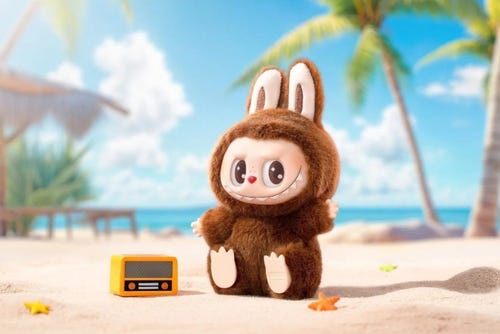Why the Labubu Craze Speaks to Something Deeper about Gen Z
It's more than a craze, its a yearning for connection
Image from Google
There’s a quote that says, “We stop looking for monsters under our beds when we realise they’re inside of us.” Turns out that’s no longer true.
The monsters are swinging from designer handbags, clutched by celebrities, and splashed across TikTok feeds. Their name? Labubu.
If you’ve never heard of one, that’s fair. But chances are you’ve seen them. They’re wide-eyed, mischievous little creatures, that sit somewhere on the scale between adorable and demonic.
They were initially created by Hong Kong designer Kasing Lung and the dolls are now sold by Chinese retailer Pop Mart. The toy gained widespread attention in April 2024 after Blackpink's Lisa was spotted with a keychain Labubu on her bag. Pop Mart’s 2024 interim report stated that the line generated sales of 6.3 billion Chinese yuan (approximately US$870 million) in the first half of the year.
These furry collectibles have become the latest must-have, especially among Gen Z. But why?
It’s easy to dismiss Labubus as another fleeting internet trend. Another thing people are buying for reasons no one fully understands. But this craze, like many others rooted in internet culture, taps into something deeper, that we should pay close attention to. A yearning for connection.
How Gen Z became the blamed Generation
The media love to blame Gen Z.
They’re accused of being lazy. Of not wanting to return to the office. Of lacking work ethic. They’re “killing” everything from 9–5 jobs to homeownership. But often lost in these sweeping generalisations is the reality that Gen Z have had to navigate a world shaped by crises older generations never had to face in quite the same way.
From growing up in the shadow of financial collapse, to watching the climate crisis escalate in real time, to going through a global health crisis, Gen Z aren’t unmotivated, they’re burnt out. When the pandemic hit, just as many of them were coming of age, it quietly stole something crucial. Their third space.
The third space – those places that aren’t work or home – is crucial. Coffee shops, youth clubs, libraries, train stations, parks, shopping centres. The places where you hung out. Drifted. Met people. Found yourself. Covid-19 stripped all of that away.
For Gen Z, this disruption came at a particularly formative moment. Many had their first years of uni derailed, their early jobs start remotely, or their friendships scattered. Those everyday, casual interactions like bumping into someone at the pub or sitting on the bus with mates, vanished overnight. But while the physical world contracted, the digital world expanded.
TikTok became more than entertainment. It became a portal for global connection. A place where niches weren’t just accepted but celebrated. Where identity could be shaped collaboratively. And where something as seemingly ridiculous as a creepy little toy could spark mass community.
Maybe the era of collectibles isn’t as silly as we think?
Labubu isn’t just a collectible. It’s a symbol. A shared language. A membership badge to a collective that says, “You get it.” It offers a point of connection in a world that has made those increasingly difficult to find.
Amidst everything going on in the world today, there’s something comforting about attaching yourself, quite literally, to something that others recognise and adore. It’s ironic, really. These tiny monsters are helping a generation feel a little less alone.
So no, it’s not just a toy. It’s an outlet. A gentle rebellion against the demand to always be serious, productive, and polished. It’s a form of comfort and connection, neatly packaged into a pocket-sized, wide-eyed creature that looks how many of us feel.
And maybe that’s exactly what Gen Z, and all of us really need right now.
If this resonated with you, share it with someone who’s still wondering why everyone’s buying ‘that weird toy’. Or better yet, tell me what connection looks like for you these days. Are you chasing it too?




